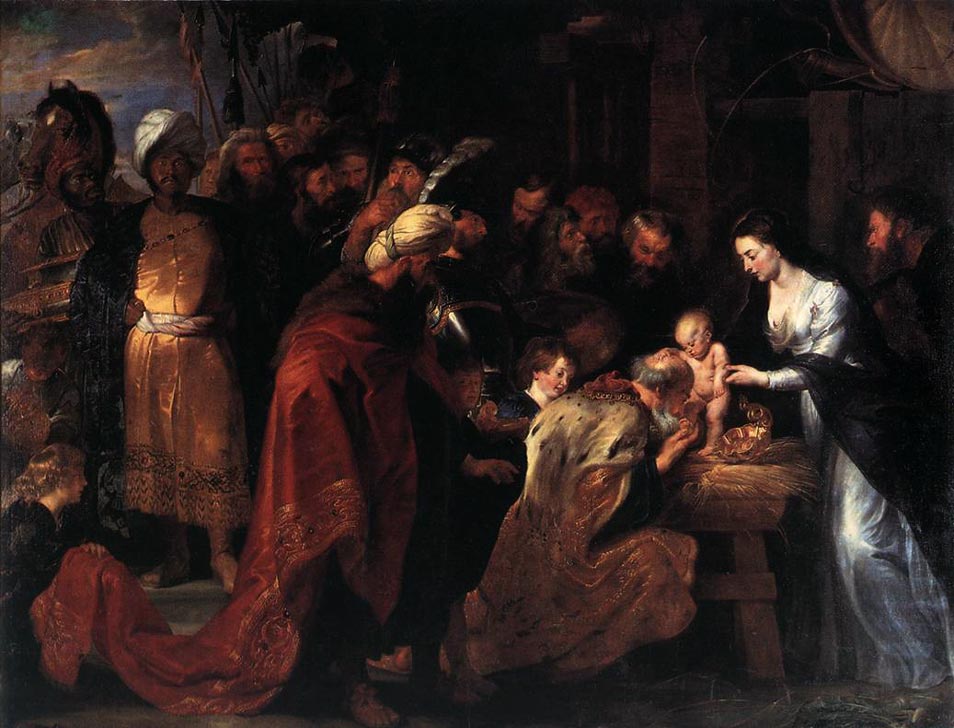Following is the prepared text from Bishop Thomas J. Olmsted’s homily for the Epiphany of the Lord.
January 7, 2018
“Where is the newborn King? …We saw His star at its rising and have come to do Him homage.” Mt 2:3
King Herod was deeply agitated by these words of the Magi; so much so that all Jerusalem was greatly troubled with him.
How different from the response of the Magi! and the exultant response of the Shepherds! When the Magi saw the star, they rejoiced and made plans at once to travel wherever it would lead, convinced that it would lead them to the Creator of the stars, the Maker of the heavens and of the earth, and above all to the King whom their restless hearts yearned to see and to adore.
But when Herod heard of the star and the newborn King, his heart moved in the opposite direction. Instead of joyful anticipation, there was firm determination to eliminate this little infant king, whom Herod falsely perceived was a rival to his throne.
How ironic that the earthly king of Jerusalem furiously rejects the newborn King precisely when the prophecy of Isaiah was being fulfilled! “Rise up in splendor, Jerusalem! Your light has come, the glory of the Lord shines upon you. See, darkness covers the earth, and thick clouds cover the peoples; but upon you the Lord shines, and over you appears His glory.” In Herod we see how a heart set on worldly pleasures resists God’s plan. Herod was not the only one who wanted nothing of this new King. The chief priests and scribes of Israel did the same. Even though they knew from God’s word in the Bible that the Messiah would be born in Bethlehem, they had no interest and made no effort to go with the Magi to worship the King whom God had sent them. We see in them no evidence of a heart eager to encounter the Lord and King, no evidence of one ready to bow down and pay homage to God. The flame of faith had gone out in their souls. They refused to open their hearts to the newborn King and His Kingdom. To the greatest event in their lifetime and of human history, they turned away.
Nonetheless, the King had indeed come; His Kingdom was at hand. The Magi rejoiced at this Good News. The shepherds also went in haste to behold this miracle of mercy. Thirty years later, when our Savior began to heal and cast out demons and to teach, He demanded a choice by His listeners (Mk 1:14f): “The Kingdom of God is at hand. Repent and believe in the Gospel.”
These words of Jesus remain as urgent today as when Jesus first spoke them. We cannot remain on the sidelines when Jesus, our Lord and King invites us to follow Him. When He offers to bring us into His Kingdom, we must make a choice: either to accept or refuse, either to put our trust in Him or to choose the false promises and allurements of darkness.
These two kingdoms are diametrically opposed to each other: “You cannot serve both God and Mammon,” Jesus says. He invites us to His Kingdom, established through His Cross and Resurrection, and that demands that we reject the false kingdom proposed by the father of lies. In the Kingdom of God, the poor like the shepherds find joy, while the wise like the Magi are filled with awe and wonder.
The King of kings will not force us to love Him. He utterly respects our freedom. But repeatedly, He invites us, “Repent and believe, The Kingdom of God is at hand.”
We have much to learn, still today, from the Magi. They traveled far, at much personal cost, but with hearts on fire with love. They knew by the gift of faith that the Father wants to give us a Kingdom! This was their one and only purpose in following the star. They sought no political gain, no financial reward, no personal advantage. They came to kneel and adore, and as an outward sign of their faith, to offer precious gifts of gold, frankincense, and myrrh.
We are told that, after adoration of the newborn King, they departed for their country by a different route. St. Augustine says that they returned home along a different path because adoration of the King had transformed their hearts. Nothing is the same again, after encountering and adoring Christ the King.
May you and I never take for granted the great blessing of knowing the King of kings, who created the moon and the stars, yet who comes into our world, even today in the humblest of ways. St. Paul says, everything else in life is just “so much rubbish” in comparison with the great honor of knowing and loving the Lord Jesus.
The Magi also teach us, by contrast to King Herod, what happens if we fail to offer God the homage of adoration, how we end up chasing empty promises and pursuing empty things that lead to quiet desperation. We end up filling our lives with created stuff but without knowing the Creator of them all.
We were created to be children of the King, disciples of the Savior. Our hearts long for more than entertainment, comfortable lifestyles, or worldly success. As St. Augustine says, our hearts are made for God and they are restless until they rest in Him.
Adoration focuses our attention not on ourselves but on the one who created and redeemed the world.
Adoration changed the Magi because, in the end, their journey across the desert was not to a place but to a person. So, they could leave that place and still remain in His presence. Like them, we place all our trust in the One whom we love and adore.





